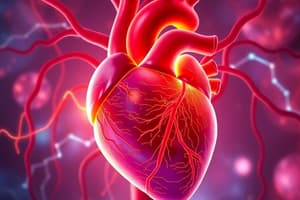Podcast
Questions and Answers
Which of the following is a diagnostic tool for Coronary Artery Disease?
Which of the following is a diagnostic tool for Coronary Artery Disease?
- Complete blood count
- Blood pressure measurement
- Chest X-ray
- Electrocardiogram (ECG) (correct)
What is a primary concern during dental care for patients with Coronary Artery Disease?
What is a primary concern during dental care for patients with Coronary Artery Disease?
- Prolonging appointment duration
- Managing patient anxiety (correct)
- Avoiding local anesthesia
- Limiting fluid intake prior to surgery
Which medication is commonly combined with Aspirin for dual antiplatelet therapy in CAD patients?
Which medication is commonly combined with Aspirin for dual antiplatelet therapy in CAD patients?
- Clopidogrel (correct)
- Rivaroxaban
- Warfarin
- Dabigatran
What should be done for high bleeding risk patients prior to dental surgery?
What should be done for high bleeding risk patients prior to dental surgery?
When is a patient who has experienced a myocardial infarction (MI) safe to be treated in a dental setting?
When is a patient who has experienced a myocardial infarction (MI) safe to be treated in a dental setting?
What defines hypertension according to the 2017 ACC/AHA guidelines?
What defines hypertension according to the 2017 ACC/AHA guidelines?
Which of the following is a common symptom of coronary artery disease?
Which of the following is a common symptom of coronary artery disease?
Which management strategy is recommended for patients with secondary hypertension?
Which management strategy is recommended for patients with secondary hypertension?
What is the recommended action if a patient's blood pressure is measured at > 160/100 mmHg during a dental procedure?
What is the recommended action if a patient's blood pressure is measured at > 160/100 mmHg during a dental procedure?
What complication is associated with untreated hypertension?
What complication is associated with untreated hypertension?
Flashcards are hidden until you start studying
Study Notes
Overview of Cardiology
- Cardiovascular disease is a leading global cause of mortality, including conditions like hypertension, coronary artery disease, heart failure, congenital defects, and strokes.
- Key areas include hypertension, coronary artery disease, valvular heart disease, congenital heart disease, heart failure, arrhythmia, and heart transplant.
Hypertension (HTN)
- Defined as consistently high blood pressure; diagnosed with systolic BP ≥ 130 mm Hg or diastolic BP ≥ 80 mm Hg.
- Two main types: primary (essential) and secondary hypertension.
- Symptoms are often absent; complications may lead to coronary artery disease (CAD), heart failure (HF), stroke, renal failure, and retinal issues.
- Diagnosis requires two elevated readings, ideally two weeks apart.
- Management includes lifestyle changes and medications (beta blockers, diuretics, ACE inhibitors, ARBs, CCBs).
- American Dental Association recommends modifications based on BP levels, with no elective procedures above 160/100 mm Hg.
Coronary Artery Disease (CAD)
- CAD occurs due to atherosclerosis narrowing blood vessels, leading to reduced oxygen and potential myocardial infarction (MI).
- Symptoms include chest pain, dyspnea, dizziness, and autonomic signs (e.g., diaphoresis).
- Diagnostics: ECG, cardiac enzymes (troponin, CK-MB), stress tests, and catheterization.
- Management involves risk reduction, medical therapy (aspirin, β-blockers, CCBs), and possible revascularization (PCI or CABG).
- In dental care, anxiety management and minimizing discomfort are vital; patients with recent MI can be treated after 30 days.
Valvular Heart Disease
- Four heart valves; dysfunction can lead to serious illness, with symptoms like murmurs, fatigue, and edema.
- Diagnostic methods include physical exams, echocardiograms, and cardiac catheterization.
- Management strategy varies between medical therapy and valve replacement; mechanical valves require lifelong anticoagulation.
Congenital Heart Disease (CHD)
- CHD is a structural heart defect present at birth, affecting heart shape/function.
- Dental considerations focus on preventing infective endocarditis, with specific antibiotic prophylaxis recommended for at-risk patients.
Heart Failure (HF)
- Defined as the heart's inability to meet bodily blood demands; commonly caused by CAD, hypertension, and other factors.
- Symptoms include dyspnea, fatigue, and lower limb edema, with specific physical findings (e.g., S3 heart sound).
- Diagnostics: history, physical exam, chest radiographs, echocardiograms, and BNP levels.
- Management includes medications, lifestyle changes, and possibly heart transplant in advanced cases.
Arrhythmias
- Caused by electrical impulse abnormalities; can be classified as tachyarrhythmias or bradyarrhythmias.
- Commonly presented symptoms include fatigue, dyspnea, and palpitations; often diagnosed via ECG.
- Management for tachyarrhythmias may involve rate or rhythm control medications; some may require pacemakers for bradyarrhythmias.
Heart Transplant
- Lifelong immunosuppression is critical for transplanted patients; watch for medication side effects like oral candidiasis.
- Dental care for these patients requires careful management of bleeding and infection risks.
Case Scenarios
- Scenario 1: For a patient with controlled high blood pressure (130/90 mm Hg), proceed with elective dental care (option A).
- Scenario 2: For a patient with a history of aortic valve replacement requiring gingival manipulation, administer amoxicillin for prophylaxis (option C).
Additional Considerations
- Distinguish between stable and unstable angina, myocardial infarction classifications (STEMI and NSTEMI).
- Recognize the risk of embolism in atrial fibrillation requiring long-term anticoagulation.
- Understand the importance of consulting physicians for patients on anticoagulants before dental procedures.
Studying That Suits You
Use AI to generate personalized quizzes and flashcards to suit your learning preferences.




